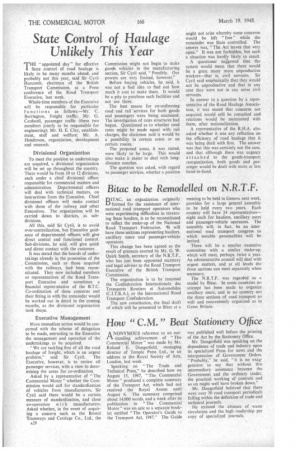State Control of Haulage
Page 30

If you've noticed an error in this article please click here to report it so we can fix it.
Unlikely This Year.
TH'. appointed day" for effective State control of road haulage is likely to be many months ahead, and probably not this year, said Sir Cyril Hurcomb, chairman of the British Transport Commission, at a Press conference of the Road Transport Executive, last week.
Whole-time members of the Executive will be responsible for particular f un c t i ons as follows:—Mr. C. Barrington, freight traffic; Mr. G. Cardwell, passenger traffic (these two members jointly to be responsible for engineering); Mr. H. E. Clay, establishment, stall and welfare; Mr. A. Henderson, organization, development and research.
Divisional Organization
To meet the position as undertakings are acquired, a divisional organization will be set up throughout the country. There would be from 10 to 12 divisions, each under a chief divisional officer responsible for commercial matters and administration. Departmental officers will deal with technical matters, on instructions from the Executive. Chief divisional officers will make contact with those of the railway and other Executives. The organization will be carried down to districts, as subdivisions.
All this, said Sir Cyril, is to avoid over-centralization, but Executive guidance of departmental officers will give direct central and functional control. Sub-divisions, he said, wiIl give quick and direct contact with the customer.
It was stated that the boards of undertakings already in the possession of the Commission, such as those acquired with the railways, had been reconstituted. They now included members or representatives of the Road Transport Executive and sometimes a financial represmtative of the B.T.C. Co-ordination of these concerns and their fitting in with the remainder would be worked out in detail in the coming months, as the divisional organization took shape.
Executive Management
More immediate action would be concerned with the scheme of delegation to be made, entrusting to the Executive the management and operation of the undertakings to be acquired.
We are tackling first of all the road haulage of freight, which is an urgent problem," said Sir Cyril The Executive, however, is to review all passenger services, with a view to determining the areas for co-ordination.
Asked by a representative of "The Commercial Motor" whether the Commission would call for standardization of vehicles from manufacturers, Sir Cyril said there would be a certain measure of standardization, and close co-operation w it h manufacturers. Asked whether, in the event of acquiring a concern such as the Bristol Tramways and Carriage Co., Ltd., the A28 Commission might not begin to make goods vehicles in the manufacturing section, Sir Cyril said, " Possibly. Our powers are very limited, however."
Before buying vehicles, he said, it was not a bad idea to find out how much it cost to make them. It would be a pity to purchase such facilities and not use them.
The best means for co-ordinating road and rail* services for both goods and passengers were being examined.• The investigation of rates structures had begun. Questioned as to whether road rates might be made equal with rail charges, the chairman said it would be a possibility in certain areas or on certain routes.
The proposed areas, it was stated, were likely to be large. This would also make it easier to deal with longdistance coaches.
The question was asked, with regard to passenger services, whether a position might not arise whereby some concerns would be left " free " while the remainder was State controlled. The answer was, "The Act leaves that very open." It was not forbidden, but such a situation was hardly likely to result.
A questioner suggested that the system would mean that there would be a great. many more unproductive workers—that is, civil servants. Sir Cyril said emphatically that they would not be unproductive and that in any case they were not in any sense civil servants.
In answer to a question by a representative of the Road Haulage Association, it was stated that concerns not acquired would still be consulted and relations would be maintained with them, after nationalization.
A representative of the R.H.A. also asked whether it was any reflection on the efficiency of road haulage that it was being dealt with first. The answer was that this was certainly not the case, and that although there was urgency a t t Et.c h e d to the goods-transport reorganization, both goods and passenger would be dealt with more or less hand-in-hand.












































































